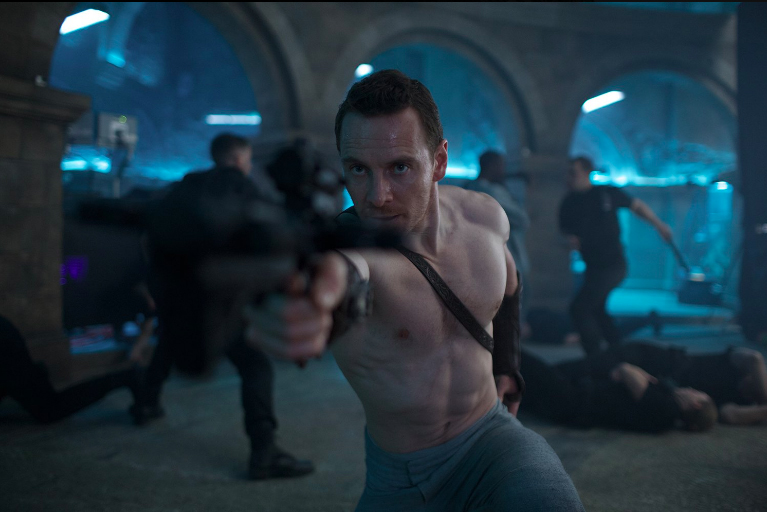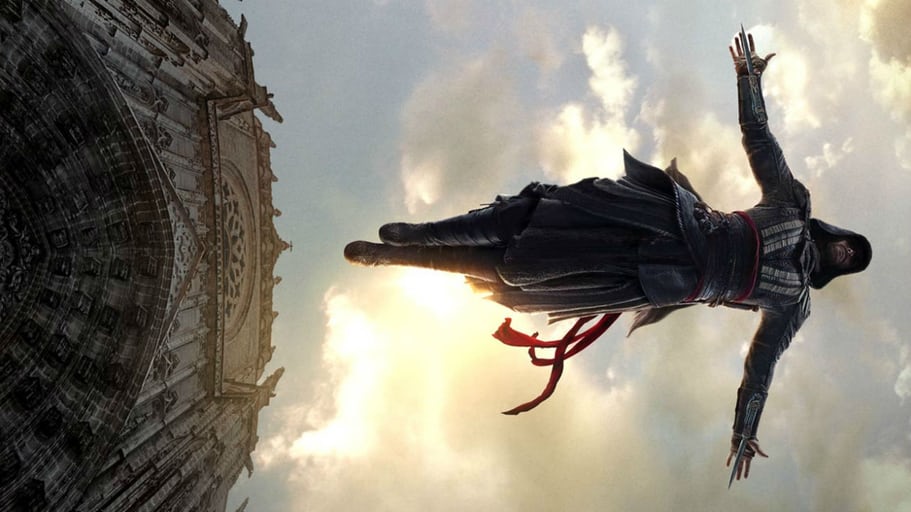Assassin’s Creed (2016)
CAST: Michael Fassbender, Marion Cotillard, Jeremy Irons, Michael K. Williams, Brendan Gleeson, Charlotte Rampling
REVIEW:
For whatever reason, Hollywood has had a hard time coming up with a successful video game-to-film adaptation, and unfortunately Assassin’s Creed does not buck the trend. An obtuse, poorly-edited mishmash of generic action sequences, narrative incoherence, and pseudo-scientific/historical mumbo jumbo that sounds like it’s out of a second-rate Dan Brown novel, one senses the movie would be direct-to-video fare without the presence of a couple of top-flight actors and a hefty budget, and frankly that’s where the quality level lies.
After an opening prologue in 1492 Spain, and another prologue in the 1980s in which a young boy, Callum Lynch, witnesses his father, dressed in assassin’s robes, murder his mother, we jump to present day Cal (Michael Fassbender) as a death row inmate awaiting lethal injection. The sentence is carried out….but then a confused Cal wakes up and finds he’s actually been knocked unconscious and spirited away to a top-secret facility in Spain run by Knights Templar Alan Rikkin (Jeremy Irons) and his scientist daughter Sophia (Marion Cotillard), who want to hook him up to a machine called the Animus to experience the memories of a distant ancestor, Spanish assassin Aguilar de Nerha, to discover the location of an ancient artifact known as the Apple of Eden, which in the wrong hands could wipe out free will.
I’m casually familiar with the video game the film is based on, and as far as I can tell, it’s reasonably faithful (albeit using original characters rather than any of the game’s protagonists), but less engaging. Perhaps a video game is just an inherently more interactive experience, but even as a stand-alone film viewed on its own merits, Assassin’s Creed is unimpressive. The premise of the Animus using “genetic memory” to transport Cal into Aguilar’s memories is vaguely-explained hokey pseudo-science, and the “Apple of Eden”, which the opening text scrawl portentously describes as “containing not only the seeds of mankind’s first disobedience, but the key to free will itself” (huh?) is a MacGuffin that the movie doesn’t even bother trying to explain the workings of. The historical conspiracy theorizing comes off like Dan Brown souped up with a dash of parkour.
To be fair, it’s not all bad. The first half or so is reasonably engaging. The fight scenes generate a momentary adrenaline rush, although director Justin Kurzel (who also directed 2015’s Macbeth starring Michael Fassbender and Marion Cotillard) overuses the gimmick of cutting back-and-forth between conventional fight scenes and Cal mime-fighting in the Animus. Kurzel’s camera swoops and soars and tries to make this all look visually dynamic, although the editing is clumsy and sometimes confusing (like a strange number of high-profile mainstream films this year). Set design, costumes, and special effects are top-notch, but that’s to be expected from any mainstream movie these days. There’s a little intrigue about the villain (insofar as there is one) having misguided, rather than evil, motives (purging the world of violence by eliminating free will), and a little early ambiguity about who the real “bad guys” are, but all this is half-baked and shallowly-developed.
But if the first half is fitfully engaging, the closer the movie gets to its climax (such as it is), the less sense it makes. The final few scenes descend into narrative incoherence (not that airtight plotting was ever a strong suit), and the conclusion is anti-climactic. The underdeveloped and underused main villain’s demise is ho-hum and fails to generate any reaction (mostly because the movie never made us care about the characters in the first place). Things are left on an open note, seemingly to leave the door open for sequels (the filmmakers have said they hope to kickstart a franchise), but in the wake of negative reviews and a lackluster performance at the box office, this seems unlikely (and has probably torpedoed any hope of a better adaptation down the road in the process).
 At first glance, the cast might give things a veneer of respectability—two-time Oscar nominee Michael Fassbender and Oscar winner Marion Cotillard, reunited from Kurzel’s Macbeth—but their talents are irrelevant here. Fassbender does the best he can with an underdeveloped character(s), bringing his trademark intensity and forceful presence to the dual role of Cal and Aguilar, and gets to show some moves and speak subtitled Spanish in the 1492 sequences, but it’s an understatement to say this won’t net him another Oscar nomination. Marion Cotillard is blandly going through the motions and unable to make anything substantial out of a paper-thin character (Sophia is ostensibly given a dash of moral conflict, but it’s too underdeveloped to mean anything). Jeremy Irons, as is often the case, is showing up to make some corny dialogue sound eloquent, and pick up a paycheck. Brendan Gleeson and Charlotte Rampling have thankless walk-on roles that amount to little more than cameos.
At first glance, the cast might give things a veneer of respectability—two-time Oscar nominee Michael Fassbender and Oscar winner Marion Cotillard, reunited from Kurzel’s Macbeth—but their talents are irrelevant here. Fassbender does the best he can with an underdeveloped character(s), bringing his trademark intensity and forceful presence to the dual role of Cal and Aguilar, and gets to show some moves and speak subtitled Spanish in the 1492 sequences, but it’s an understatement to say this won’t net him another Oscar nomination. Marion Cotillard is blandly going through the motions and unable to make anything substantial out of a paper-thin character (Sophia is ostensibly given a dash of moral conflict, but it’s too underdeveloped to mean anything). Jeremy Irons, as is often the case, is showing up to make some corny dialogue sound eloquent, and pick up a paycheck. Brendan Gleeson and Charlotte Rampling have thankless walk-on roles that amount to little more than cameos.
The original cut of Assassin’s Creed reportedly ran over two hours before being trimmed down to a fairly slim hour and forty-eight minute runtime. Perhaps the material that got lost on the cutting room floor would have made a difference, or perhaps not. We’ll probably never know. The rest of the movie may as well have been left on the cutting room floor too. Fans of Assassin’s Creed are better off staying home and playing the game.
* *
